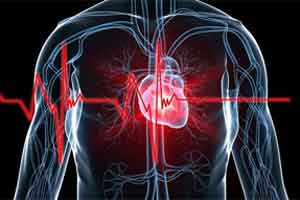- Home
- Editorial
- News
- Practice Guidelines
- Anesthesiology Guidelines
- Cancer Guidelines
- Cardiac Sciences Guidelines
- Critical Care Guidelines
- Dentistry Guidelines
- Dermatology Guidelines
- Diabetes and Endo Guidelines
- Diagnostics Guidelines
- ENT Guidelines
- Featured Practice Guidelines
- Gastroenterology Guidelines
- Geriatrics Guidelines
- Medicine Guidelines
- Nephrology Guidelines
- Neurosciences Guidelines
- Obs and Gynae Guidelines
- Ophthalmology Guidelines
- Orthopaedics Guidelines
- Paediatrics Guidelines
- Psychiatry Guidelines
- Pulmonology Guidelines
- Radiology Guidelines
- Surgery Guidelines
- Urology Guidelines
Extreme changes in daily temperatures lead to increased MI rates

Mild shifts in the weather are not just annoying they may have health implications also.Dr.Hedvig Andersson, from University of Michigan, Ann Arbor and colleagues conducted an observational study to find out the relation of changes in weather with the incidence of cardiovascular problems.The researchers have found that more extreme the difference between weather’s daily lows and highs, the greater the rise in STEMI cases.This implies that big Swings in daily temperatures is linked to increasing in MI Rates.The study is to be presented at the American College of Cardiology (ACC) 2018 Scientific Session in Orlando, FL.
Andersson et al analyzed information on 30,404 STEMI patients treated with PCI at 45 hospitals in Michigan between 2010 and 2016. Information on daily temperatures from WeatherUnderground.com was assessed by hospital zip code. The researchers looked at the maximal and minimal temperatures for each day at 24 hours, 48 hours, and 1 week prior and 2 weeks prior to the STEMI.
There is a large body of evidence showing that outdoor temperature affects the rate of heart attacks, with cold weather bringing the highest risk, but most previous studies have focused on overall daily temperatures. This new study is among the first to examine associations with sudden temperature changes.
“While the body has effective systems for responding to changes in temperature, it might be that more rapid and extreme fluctuations create more stress on those systems, which could contribute to health problems,” Andersson said, noting that the underlying mechanism for this association remains unknown.
Along with an overall warming trend, climate change is projected to lead to more extreme events, such as heat waves and cold snaps, depending on where someone lives, the researchers explained.
“As the temperature fluctuation increases, the likelihood of having a myocardial infarction increases,” said senior author Hitinder Gurm, MD (University of Michigan, Ann Arbor), in a web briefing for reporters hosted by the American College of Cardiology (ACC) ahead of the group’s annual meeting.
For every 9-degree-Fahrenheit differential between the daily low and high temperatures, the risk of MI increased by about 5%, the analysis suggests. Although large fluctuations were relatively infrequent overall, the researchers found an approximate 10% increase in MIs on days when the temperature rose or dropped by more than 30 degrees. The effect was most pronounced when the temperature got warmer throughout the day as opposed to colder.
Rates of MI cases increased 2.4% when the low and high daily temperatures were separated by 10 to 20 degrees. As daily highs and lows fluctuated greater than this—20- to 30-degrees of difference, to a high of more than 30 degrees of difference between the daily low and high—rates of MI increased by 8.6% and 13.4%, respectively.
“When we modeled this, a fluctuation of 37 to 40 degrees Celsius (66.6 to 72 degrees Fahrenheit) would give you almost a doubling of the risk of myocardial infarction,” Gurm added.
Gurm cautioned that the association does not necessarily prove that sudden temperature swings are the cause of the increase in heart attacks; other factors may have contributed to the results. He noted that it remains important to focus on modifiable cardiovascular risk factors such as smoking, high blood pressure, and high cholesterol.For now, Gurm suggested, more study of the issue is needed to determine if there are strategies that could negate the negative effects of temperature fluctuations on the heart.

Disclaimer: This site is primarily intended for healthcare professionals. Any content/information on this website does not replace the advice of medical and/or health professionals and should not be construed as medical/diagnostic advice/endorsement or prescription. Use of this site is subject to our terms of use, privacy policy, advertisement policy. © 2020 Minerva Medical Treatment Pvt Ltd